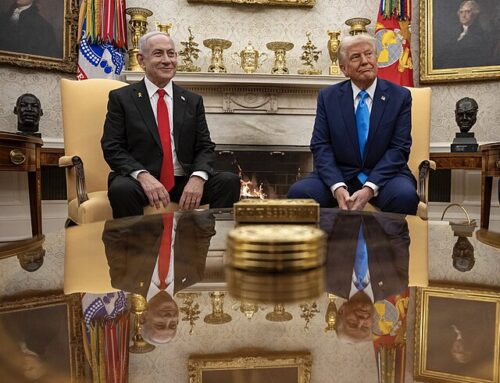In June, I attended part of the Workmen’s Circle convention weekend at the Circle Lodge in Sylvan Lake, NY. In particular, I attended a session featuring the Shalom Center’s Art Waskow and United For Peace and Justice (UFPJ) director Leslie Cagan on the anti-war movement. In my question to them, from the floor, I mentioned that Israel and the so-called ‘Israel Lobby’ were falsely accused of creating the war in Iraq while also raising the fact that Iran’s threatening behavior and rhetoric is now placing Israel front and center in the crisis over Iran.
Rabbi Waskow acknowledged that Israel was not actually a reason for the war in Iraq. And Ms. Cagan came the closest I’ve heard her to endorsing a two-state solution for Israel and Palestine– but not quite that far; she voiced with a titter something of a throw-away line that Israelis and Palestinians should be able to make peace. If I had the presence of mind to say all that I might have at that moment, I would have added the following: that it’s important to emphasize that Israel and its supporters were not responsible for the war in Iraq, that the Israeli-Palestinian conflict bears no real relationship to the war in Iraq (notwithstanding how the UFPJ has seen this) and that Israel is central to the Iran issue only because of Iran’s hostile actions and rhetoric.
Directly after this session, I privately discussed with Larry Bush (editor in chief of the Workmen’s Circle’s Jewish Currents magazine) exactly the concern he has just articulated on his blog:
What if the surge is working in Iraq? How should those of us who have opposed this war from the start respond? Jewish Currents is currently working with the Workmen’s Circle and the Shalom Center to organize a November 23rd activism connference, Jews Uniting Against the War and to Heal America, at Central Synagogue in NYC. [Speakers will include Meretz USA’s Lilly Rivlin.]
Click here to read the rest of his posting.



Gee Ralph, it sure seems that thou doth protesteth a bit too much:
“I would have added the following: that it’s important to emphasize that Israel and its supporters were not responsible for the war in Iraq, that the Israeli-Palestinian conflict bears no real relationship to the war in Iraq.”
But can you concede that one important motivation for some very important people involved in supporting the war in Iraq was supporting (in their mind) Israel?
As just a few of many examples:
Israeli Foreign Minister Shimon Peres at The Council on Foreign Affairs in Washington, DC, Sept, 2002
http://query.nytimes.com/gst/fullpage.html?res=9C02E7DA1E31F937A2575AC0A9649C8B63
While Mr. Peres said the administration must decide whether to go to war without considering Israel, he left no doubt that he felt Mr. Bush had no choice but to attack Iraq.
”To postpone the attack now is taking the same risk maybe as in 1939, in the face of Adolf Hitler,” he said. ”Time is very short. The lives of innocent people are in danger.”
Mr. Peres added, ”We can imagine now some of the dangers, but this is our duty.”
From “A Clean Break”, by, among others, future Bush Administration staff and Iraq war advocates Richard Perle, Douglas Feith, David Wurmser
http://www.iasps.org/strat1.htm
“Israel can shape its strategic environment, in cooperation with Turkey and Jordan, by weakening, containing, and even rolling back Syria. This effort can focus on removing Saddam Hussein from power in Iraq — an important Israeli strategic objective in its own right — as a means of foiling Syria’s regional ambitions. Jordan has challenged Syria’s regional ambitions recently by suggesting the restoration of the Hashemites in Iraq. This has triggered a Jordanian-Syrian rivalry to which Asad has responded by stepping up efforts to destabilize the Hashemite Kingdom, including using infiltrations. Syria recently signaled that it and Iran might prefer a weak, but barely surviving Saddam, if only to undermine and humiliate Jordan in its efforts to remove Saddam.”
And on your second point, let’s see, in Iraq and Palestine:
-Close Non-Arab allies (US and Israel) militarily occupy Arabs
-Close Non-Arab allies violate human rights of Arabs
-Close Non-Arab allies seize vital resources from Arabs
-Close Non-Arab allies use vastly superior military capacity against largely civilian Arab population
-Close Non-Arab allies attempt to quell popular Arab uprisings
-Close Non-Arab allies attempt to install friendly governments
-Close Non-Arab allies use war on terrorism as a primary justification for their actions
-Close Non-Arab allies at times espouse clearly racist and Islamophobic ideologies
-Iraq war architect Ahmed Chalabi pledges that the new Iraqi gov’t will quickly make peace with Israel
-Many policy-makers from close non-Arab allies move in same circles, have strong personal relationships, and share similar political views
You’re right again Ralph, doesn’t look like any real relationship between Iraq and Palestine to me. What is wrong with that Leslie Cagan? Eventually, the evidence will force her to come around to your view though.
Ted